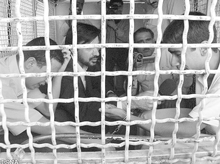Reports of homosexual executions increase, even as sources live in fear
There have been reports of another execution of a gay man in the city of Arak, Iran, on August 16, and of the execution of four other men, aged 17 to 23, for unspecified “sexual offenses.”
But it has not been possible to confirm these reports with complete certainty because of the climate of fear that prevails in the Islamic Republic of Iran today. The newly elected, reactionary regime of President Mahmoud Ahmadinejad has heightened its campaign of repression of gay people since the worldwide protests against the hanging of two gay teens in Mashad on July 19. Iranians—both gay and straight—are afraid to communicate with the outside world on these matters.
Ahmadinejad is slated to visit New York in September to address the United Nations General Assembly and to meet with Iranians living in the U.S. President George W. Bush has indicated that the U.S. will not interfere with his ability to enter the country.
As the beginning of the week, 365gay.com posted an article claiming that a gay man had been executed in Arak on August 16, and cited as its source the British newspaper The Observer. But, when this reporter reached the author of The Observer’s article, the newspaper’s social affairs editor Jamie Doward, he said that the newspaper had no independent source for his article’s one sentence reference to this new execution, and that he obtained the information from a private e-mail he received from the British gay rights group OutRage.
At the same time, a French gay group, Solidarite Internationale LGBT, sent out an alert this week reporting that a gay man had been executed in Arak, but on a later date—August 19—and adding a new detail: that this man was one of the two men who, as Gay City News reported last week, had been condemned to be executed in Arak on August 28 and were “gay” according to gay Iranian sources. The French group cited no sources and no other details, and attempts to reach the group by phone and e-mail were unsuccessful by press time.
When this reporter tried to confirm from Iranian sources the reports that had appeared in The Observer and the French bulletin, an underground Tehran ‘zine for gays published in Farsi—whose editors requested, out of fear, that neither their names nor that of their publication be cited—replied that a man had been hanged in Arak’s public square on August 16, but that they had no information as to his sexuality.
These editors were also the source, OutRage’s Brett Locke said by telephone, for the information his group received about the latest execution in Arak. Since the communications with Iran, both by this non-Farsi speaking reporter and by OutRage, were in English, there may have been a language problem in getting to the bottom of the contradictions between the differing reports all sourced from the Iranian gay ‘zines editors, whose English is far from perfect.
Farshad Hoseini of the Netherlands secretariat of the International Federation of Iranian Refugees (IFIR), when asked about the alleged August 16 execution, said that his group had knowledge of a public hanging, in Arak’s main square, of a 21-year-old man—but said it had taken place two days earlier, on August 14. Hoseini, too, said IFIR had no information about the young man’s sexuality, explaining that the official charge against him was homicide.
Afdhere Jama, editor of the gay e-zine for Muslims, Huriyah, based in San Francisco—who just returned from a lengthy European trip, during which he met with Iranian exiles—told this reporter this week that his Iranian contacts, both inside and outside Iran, were upset with the way some human rights organizations in the West were so readily accepting the official government versions of the crimes for which men thought to be gay were being executed, explanations that included charges of rape.
“Under Islamic law, which has been adopted by the Islamic Republic of Iran’s legal system, it takes four witnesses to prove an act of homosexuality, which is a capital crime,” Jama explained. “That’s why it’s much easier for the Islamic government to invent other criminal charges against gay people to get rid of them.”
In an e-mail to this reporter from the underground gay publication in Iran, its editors expressed a similar view, saying, “The government invents all kinds of charges on gay people that are not true, and are not to [be] believed.” They urged those in the West to be “very careful” before accepting such criminal charges at face value.
On August 23, the new Web site Iran Focus—run by Iranian exiles—posted a story reporting, “Four young men between the ages of 17 and 23 were hanged in public in the port city of Bandar Abbas.” Citing as its source “the ultra-Islamist daily” Kayhan, Iran Focus added, “All four were accused of sexual offences and theft. The daily quoted an unnamed Justice Ministry official as saying that the reason why young men were committing so many sex offences was that ‘they are not aware of the punishment for their offences under Islamic laws.’”
That is what the two gay teens hanged in Mashad in July had said through their attorney, according to multiple published reports—that they were unaware homosexual acts between two consenting people constituted a crime. Thus, the statement by the Justice Ministry official strongly suggests—although this conclusion remains speculative—that the “sexual offences” for which the four young men in Bandar Abbas were executed was homosexuality.
The following day, Iran Focus reported, “Iran’s clergy-dominated Supreme Court has given the green light for the hanging of a 16-year-old schoolboy in Tehran, a state-owned daily reported on Wednesday. The boy, identified only by his first name Mostafa, was convicted of killing a man in a scuffle that began when the boy tried to save a girl who was being harassed by the drunken man… Mostafa, who had no criminal record, told the Islamic judge that when he saw the drunken man insult and harass a young girl near his home in Tehran’s Pars district, he intervened and tried to save the girl, but the foul-mouthed man began to beat him. In the brawl that followed, Mostafa killed the man.”
Iran Focus cited as its source the pro-regime daily Etemaad. Iran is a signatory to two international treaties by which it pledges not to execute
minors.
In a related development, the British gay rights group Stonewall this week asked the U.K. home secretary, Charles Clarke, to halt the deportation of a 29-year-old gay Iranian back to his home country, which was ordered by a judge in what Stonewall called an instance of “institutional homophobia.”
In ordering the deportation, the British judge used homophobic language, writing that the Iranian man had been “engaging in buggery” and describing his sexual orientation as a “predilection.”
“I am shocked that this sort of language is still being used in 2005,” Stonewall’s Ben Summerskill said.
The gay man, whose name was not disclosed to protect him if he is deported, said he fled Iran after a gay friend was arrested by police, who seized a videotape of the two men kissing, and asserted that he fears for his life if returned to his home country.
Another Iranian gay man, 26-year-old Hussein Nassen, committed suicide in July two weeks after the U.K. refused his appeal for asylum. Hussein fled from Iran in March 2000 after being imprisoned for three months for his sexuality. Friends said Hussein feared he would be executed in Iran.
Doug Ireland can be reached through his blog, DIRELAND, at http://direland.typepad.com/direland/.
gaycitynews.com

































